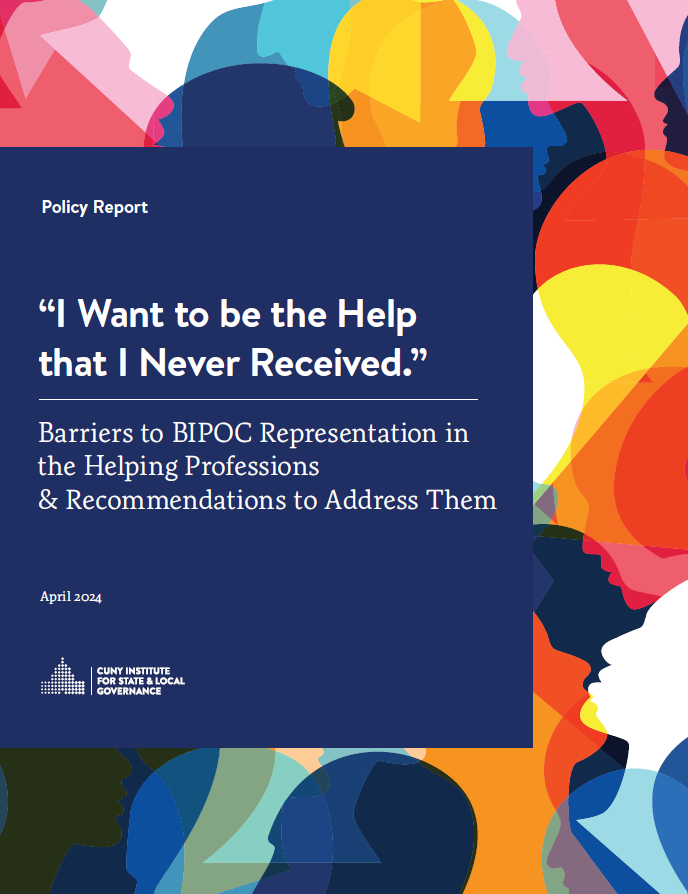“I Want To Be The Help That I Never Received”: Barriers to BIPOC Representation in the Helping Professions & Recommendations to Address Them
Roughly 60 percent of the U.S. population identifies as non-Hispanic white, 14 percent as Black, 19 percent as Hispanic/Latine, 6 percent as Asian, and 3 percent as some other race. Yet, an overwhelming majority of practicing psychologists identify as white (81 percent), with only 8 percent identifying as Hispanic/Latine, 5 percent as Black/African American, and 3.7 percent as other non-white racial/ethnic groups.
The underrepresentation of Black, Indigenous, and People of Color (BIPOC) in the helping professions—defined as careers aimed to support/address people’s well-being, such as social workers, psychologists, psychiatrists, or similar—has profound consequences for the well-being of BIPOC communities and for society’s well-being writ large.
In the second half of 2023, CUNY ISLG was approached by a funder to uncover the reasons for the underrepresentation of BIPOC communities in the helping professions, with the goal of developing recommendations for investments designed to address them. Specifically, this process focused on the barriers to becoming a helping professional, as well as remaining and advancing as one.
Researchers conducted a literature review of barriers and strategies for addressing them across different disciplines/professions (i.e., social work, psychology, and psychiatry). They also spoke with 133 individuals who were willing to share about their own experiences. From these endeavors, CUNY ISLG distilled the following recommendations:
Create a continuum of exposure opportunities for future BIPOC helping professionals
Provide training & technical assistance to nonprofit and university leadership on holistic, equitable admissions and hiring
Offer financial support and wraparound services to BIPOC people who are pursuing careers in the helping professions
Incentivize representation in degree programs and workplaces
Create more inclusive curricula and approaches at learning institutions
Offer foundational and remedial courses for underrepresented students and practitioners
Invest in advancement opportunities for BIPOC helping professionals
Create pathways for non-clinical professionals seeking employment in the helping professions
Provide mentorship and interpersonal support during degree programs, internships, placement, and in securing and advancing in permanent positions
Help students prepare for placement and licensure exams
Improve internship placement experiences
Improve working conditions
Promote reforms to orient the field toward justice and equity
Using this report as a roadmap for going forward, CUNY ISLG seeks to continue this work. With all that has been done in the past decade toward righting inequities in the helping professions, the time is ripe to take a meaningful, data-driven approach to supporting BIPOC people in preparing for, entering, and advancing in these fields. CUNY ISLG welcomes any inquiries or collaborations from interested partners.
In addition to the citations mentioned in the report, CUNY ISLG has compiled a list of complementary resources for further exploration across themes like racial equity in psychology, dismantling racism, mental health, health equity, and more.
-
A Guide for Sustaining Conversations on Racism, Identity, and our Mutual Humanity.Steve Burghardt, Kalima DeSuze, Linda Lausell Bryant, and Mohan Vinjamuri.
“A historic apology: The American Psychological Association’s commitment to dismantling systemic racism and advancing racial equity in psychology.” Isis H. Settles, Martinque K. Jones, NiCole T. Buchanan, Kristie Dotson, Petal Grower, Michael O’Rourke, Marisa Rinkus, and Kyjeila Latimer. American Psychologist.
Bridging the Gap: Challenges and Solutions for a Thriving Behavioral Health Workforce. NYC Mayor’s Office of Community Mental Health. January 2025.
"Confronting scientific racism in psychology: Lessons from evolutionary biology and genetics." Kevin A. Bird, John P. Jackson Jr., Andrew S. Winston. American Psychologist.
"Dismantling Racism in the Field of Psychology and Beyond: Introduction to the Special Issue.” Germine H. Awad , Kevin O. Cokley, Lillian Comas-Díaz, Gordon C. Nagayama Hall, Joseph P. Gone. American Psychologist.
“Dismantling racism through partnership with resettled refugee communities.” Maryam Kia-Keating. American Psychologist.
“Each One, Teach One: Critical History as Counterstories, Antiracist Affordances, and Cues for Belonging.” Phia S. Salter , Michael J. Perez, Jericka S. Battle, Jaren D. Crist. American Psychologist.
“Epistemic Exclusion: A Theory for Understanding Racism in Faculty Research Evaluations.” Isis H. Settles , Martinque K. Jones, NiCole T. Buchanan, Kristie Dotson, Petal Grower, Michael O’Rourke, Marisa Rinkus, Kyjeila Latimer. American Psychologist.
“Mending fragile alliances to fight racism: A developing framework for cross-racial/ethnic solidarity.”Donna L. Demanarig, Kevin Cokley, Samuel T. Beasley, Liza Hita, Hanan Hashem, Pooja Mamidanna, Christin Mujica, Alfonso Mercado. American Psychology.
“Racism in counseling and psychotherapy: Illuminate and disarm.” Derald Wing Sue, Helen A. Neville, Laura Smith. American Psychologist.
"Reducing racial bias in scientific communication: Journal policies and their influence on reporting racial demographics.” Sakaria Laisene Auelua-Toomey, Elizabeth Mortenson, Steven Othello Roberts. American Psychologist.
“Reflections from the wading pool: Detoxifying racist psychological waters while submerged in their waves.” Riana Elyse Anderson, Shawn C. T. Jones. American Psychologist.
"Research as resistance: Naming and dismantling the master narrative of “good” science." Leoandra Onnie Rogers, Ursula Moffitt, Kate C. McLean, Moin Syed. American Psychologist.
“Standing against racial capitalism: Reconsidering psychology’s role in dismantling systemic racism.” Daniel José Gaztambide, Patience Ojionuka, Sarah Simon, Jasmine Rename, Gabriella Diaz, Josh Stell. American Psychologist.
"The manifestation of health equity tourism in psychological science and research.” Lorraine T. Benuto, Ana J. Bridges. American Psychologist.
“The misperception of organizational racial progress toward diversity, equity, and inclusion.” Brittany Torrez, LaStarr Hollie, Jennifer A. Richeson, Michael W. Kraus. American Psychologist.
The Ripple Effects of the Adolescent Behavioral Health Crisis: Recent Trends and Impacts on American Adolescents, Families, and Society. Giovanna Braganza, MPH, and Amy Lin. United Hospital Fund.
The State of Mental Health of New Yorkers.Meghan Hamwey, Christina Norman, Rachel Suss, Ellenie Tuazon, Elisabeth Carey, Jonathan McAteer, Christine Fei, Liza King, Jasmine Abdelnabi, Tiffany Arango, Jo-Anne Caton, Magdalena Gareca, Alexandra Harocopos, Jaynisha Jackson, Christian Jimenez, Danielle Khalife, Kate Klein, Shivani Manta, Nicole Stratton. New York City Department of Health and Mental Hygiene.
Transforming Careers in Mental Health for BIPOC: Strategies to Promote Healing and Social Change.Doris F. Chang and Linda Lausell Bryant.
“Truth and Reconciliation for Whom? Transitional Justice for Indigenous Peoples in American Psychology.” Jillian Fish, Jeffrey Ansloos, Victoria M. O’Keefe, Joseph P. Gone. American Psychologist.


